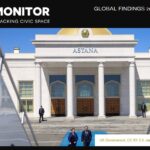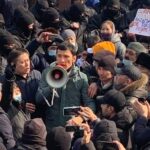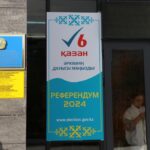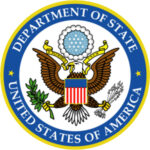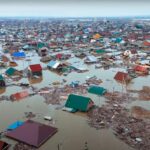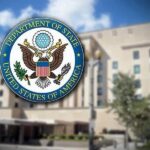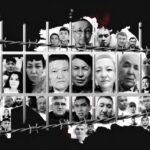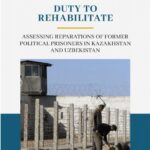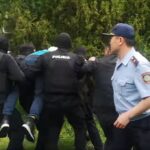The domestic policy
Almost a year after the tragic events in Zhanaozen, celebrations on the occasion of the Day of the First President were held with pomp in Kazakhstan. Strengthening of the personality cult of Nursultan Nazarbayev constitutes the main objective of officials.
On the 1st of December, 2012, Kazakhstan celebrated a new national holiday, the Day of the First President. According to the law passed by the Parliament on the 10th of December, 2011, the holiday will be celebrated every year on the 1st of December. A group of members of the upper house of parliament proposed holding the celebration on this day, as it was on the 1st of December that Nursultan Nazarbayev was elected President of Kazakhstan[1].
Independent journalists and civil society activists had urged the authorities to cancel the celebration due to the anniversary of the Zhanaozen tragedy. Despite this, the holiday was celebrated pompously.
On the 30th of November, 2012, the ‘Nazarbayev University’ held a conference entitled “Nazarbayev’s first reading”, where scientists and politicians compared Nazarbayev with the first U.S. president and called him a ‘passionar’ (charismatic) leader’ and the ‘father of the independent state’. At the conference, it was stated: “In the modern world, the president of Kazakhstan has no equals in terms of experience, wisdom, faith, vision, and effectiveness”[2]. Also, on the 30th of November, 2012, the Petropavlovskiy Regional History Museum displayed the President’s books, his portrait and his furnace-man master working suit[3].
On the 1st of December, 2012, in the Karaganda Province, on the occasion of the ‘holiday’, 1200 tree seedlings were planted and an athletic race was organised despite the -20degree temperature[4]. In other provinces, demonstrations, dance performances and sports events were organised “in honour of the President’.
A renowned Kazakh analyst Dosym Satrapayev believes that these events confirm the strengthening of the cult of personality in Kazakhstan[5].
_________________________________________________________________________________________
The European Union is interested in the deepening of cooperation with Kazakhstan and it supports Nursultan Nazarbayev’s foreign policy initiatives, – stated Catherine Ashton. Representatives of the civil society in Kazakhstan were disappointed with the fact that in her assessment Catherine Ashton paid little attention to human rights violations in the country.
On the 30th of November, 2012 in Astana, High Representative for Foreign Affairs and Security Policy of the European Union Catherine Ashton met with President of Kazakhstan Nursultan Nazarbayev. Ashton declared that the European Union was interested in active cooperation between the EU and Kazakhstan, especially in the fields of economics and security. She also asserted that the EU supports Kazakhstan’s aspiration to join the World Trade Organisation. Ashton supported Nursultan Nazarbayev on issues of integration in Central Asia, and stressed the strategic importance of the region for the EU. Regarding the topic of human rights, Catherine Ashton highlighted the importance of Kazakhstan’s moving forward “with the support of the civil society and human rights”[6]. Kazakh journalists and activists were disappointed with the fact that Ashton had not given special emphasis to the issue of human rights violations in the country.
__________________________________________________________________________________________
Human rights
On the 7th of December, 2012, re-arrested Vadim Kuramshin was sentenced to 12 years in a strict regime prison with confiscation of property. Counsels have accused the court of bias.
On the 20th of November, 2012 in the Inter-district Specialised Court for Criminal Matters in the Zhambyl Province, a preliminary hearing of the defender Vadim Kuramshin, who was accused of extortion again, was held.
As we reported earlier, on the 31st of December, 2012, Vadim Kuramshin was arrested in connection with the fact that the Appellate Court had reconsidered his acquittal, and, as a consequence, the case was ordered for retrial. Vadim Kuramshin’s arrest took place shortly after his return from Warsaw, where he had given a speech at the OSCE Human Dimension Conference, devoted to the issues of a national implementation of commitments in the field of human rights[7]. Earlier, Usen Suleimenov, RK MFA Ambassador at Large, gave assurances that the authorities were not going to arrest the human rights activist after his return from the OSCE meeting[8].
On the 22nd of November, 2012, it became known that judge Nurmukhammat Abidov had dismissed the cassation filed by Vadim Kuramshin’s counsel, explaining his decision by the fact that the case has already been taken up for reconsideration and the Appellate Court may not request the file be sent back for examination. However, Vadim Kuramshin’s counsels say that they could not file a cassation within the established time limit, because they did not receive the decision of the Appellate Court in time[9]. Counsel Raziya Nurmasheva filed a motion requesting that the judge be challenged and that the trial be transferred to another province as one of the victims worked in the Prosecutor’s Office of Zhambyl Province. The court dismissed the petition.
On the 7th of December, 2012, oral statements were held in the court. Iskander Alimbekov and Raziya Nurmasheva, Vadim Kuramshin’s counsels, were not able to attend the hearing and they petitioned that the hearing be postponed. But the judge decided to hold an oral hearing in the absence of the main counsels of the human rights activist, and subsequently, a guilty verdict was declared[10].
_________________________________________________________________________________________
The government is preparing amendments to the legislation on labour unions, which will significantly limit the labour rights of citizens.
On the 5th of December, 2012, Director of the Department of Labour and Social Partnership in the Ministry of Labour and Social Protection, Akhmadi Sarbasov stated that the government would propose a new law ‘On Labour Unions’ in the beginning of 2013. With this law, the government is planning to increase the duties and responsibilities of labour unions[11]. Journalists argue that the new law does not expand the rights of labour unions, but rather forces them to participate in a “social partnership”, which makes it virtually impossible to organise labour protests and to demand higher salaries. In addition, the new law allows the employer to create labour unions which will be loyal to him[12].
_________________________________________________________________________________________
The freedom of mass media
On the 27th of November, 2012, in Astana, during the round table on the analysis of the National Action Plan for Human Rights 2009-2012, experts stated that the situation surrounding freedom of speech in Kazakhstan was worsening.
Chairman of the Media Alliance of Kazakhstan Adil Dzhalilov noted that journalists were limited in their right to obtain information about officials. President of the International Foundation for Protection of Freedom of Speech ‘Adil Soz’, Tamara Kaleyeva, spoke about numerous legal restrictions in the work of journalists. Officials often sue journalists for libel or attempts to cause damage to their business reputation, whereas in Europe this practice has not been used for many years. Also, the criminal law of Kazakhstan provides for sanctions in the form of media outlet shutdowns, confiscation of a circulation or seizure of equipment. Administrative law contains more than 40 administrative violations in the field of mass media activity[13].
_________________________________________________________________________________________
Concerns over the worsening situation surrounding freedom of speech in Kazakhstan proved to be legitimate as new documentary films, discrediting the activity of oppositionists and civil society activists, appear.
On the 15th of November, 2012, the state television channels ‘Khabar’ and KTK broadcasted a documentary film entitled ‘The immoral Alga!rhythm’, which claims that the oppositionists from ‘Alga’ have been associated with Islamic fundamentalists and were preparing a series of terrorist attacks in Almaty.
On the 26th of November, 2012, a video clip of unknown origin was placed on youtube. In the video footage, the opposition and NGOs are labelled “vile traitors”, “beasts” who “live among us” and “multiply like rats”. The film says that these “traitors” are very aggressive towards “your president” and under the pretext of social assistance they are trying to “incite social discord”. Some specific individuals are called “traitors”: theater director Bolat Atabayev; convicted politician Vladimir Kozlov, the exiled politician Mukhtar Ablyazov, independent journalists Inga Imanbay, Zhuldyz Toleulova and Lukpan Akhmediyarov, as well as civil society activists Bakhytzhan Toregozhyna and Zhanbolat Mamay[14].
__________________________________________________________________________________________
Terrorism
During the trial in the high-profile case of Vladislav Chelakh, attorneys and the defendant accused the judge of obstructing the work of the defence. Vladislav Chelakh denies any wrongdoing and claims he was compelled to incriminate himself under the influence of threats and torture exerted by interrogators.
On the 19th of November, 2012, the Taldykorgan Specialised Inter-district Military Criminal Court commenced the trial in the case of Vladislav Chelakh, who is charged with the murder of 14 soldiers and a hunter at the ‘Arkankergen’ border post in the Almaty Province on the 28th of May, 2012. Previously, we reported that Vladislav Chelakh had been subjected to torture and psychological pressure[15].
The General Prosecutor’s Office announced that the trial would be open and objective to the greatest possible extent[16]. The examination of the documents marked as ‘secret’ will be held in private sessions.
A special room was assigned for media representatives; according to journalists, it had poor acoustics. Only press photographers were allowed to stay in the courtroom; however, the defendant requested that they be removed from the room as it was very noisy and it made it impossible for him to speak. Throughout the meetings, Judge Erbol Akhmetzhanov has denied all motions filed by the defence, including the request to send the case back for further investigation. For this reason, counsel Serik Sarsenov has challenged the judge twice.
On the 21st of November, 2012, the court decided to view video recordings from the jail in which the defendant confesses to the murder during his conversation with his inmates. The counsel Serik Sarsenov requested the judge watch the video materials after the examination of witnesses, as this may affect their testimony. The judge denied the motion, after which Vladislav Chelakh stated that he considered the trial unfair, and in order to show the protest, he attempted suicide: he tried to cut his wrists with a piece of plastic. Vladislav Chelakh refused to be present in the room and agreed to testify only after the evidence of his guilt is examined in the court[17]. In the recordings, Vladislav Chelakh is confessing to killing the guards[18]. Counsel Serik Sarsenov believes that Vladislav Chelakh defamed himself because there are inconsistencies between the defendant’s testimony and the facts.
On the 23rd of November, 2012, two relatives of the victims declared that they did not believe Vladislav Chelakh was guilty as one person could not have committed this crime.
On the 5th of December, 2012, Vladislav Chelakh testified in court that he had not killed his colleagues. According to him, on the 28th of December, 2012, the post was attacked, and he ran away to hide in the mountains. A few hours later he went back to the barracks and saw many dead bodies. For fear of the attackers, Vladislav Chelakh decided to set fire to the post, having previously taken the phones and money of those killed in order to sustain himself for a while. When setting fire to the post, Vladislav Chelakh noticed the dead bodies of several strangers. The defendant argues that he was forced to write the confession having been tortured, and the content was dictated to him by investigators. Vladislav Chelakh also testified that on the 5th of June, 2012, the man who presented himself as NSC lieutenant-colonel, urged him to confess his guilt so that the real criminals wouldn’t be frightened away. This person persuaded Vladislav Chelakh that his cell was tapped, and he advised Chelakh to tell his fellow inmates about the atrocities which he allegedly committed, reasoning that other inmates can kill him[19].
On the 7th of December, 2012, during the trial, the prosecutor requested lifetime imprisonment for Vladislav Chelakh. An oral statement of the parties are scheduled for the 10th of December, 2012. Counsel Serik Sarsenov does not intend to appear in court, because, as he states, there is not enough time to prepare a statement of defence.
__________________________________________________________________________________________
Amendments to the law on terrorism, which have been adopted by Parliament, may cause a new wave of politically motivated persecution in Kazakhstan.
On the 6th of December, 2012, the Senate of the Parliament of Kazakhstan approved an amendment to the law on the fight against terrorism. The amendment was initiated by the National Security Committee. The NSC suggests that terrorism should not be considered as a specific criminal offence, but primarily as a social phenomenon. In the new draft law, the concept of ‘terrorism’ is defined as a social phenomenon, aimed at achieving political and other objectives by individuals or groups of individuals, through violent, criminal methods[20]. The Deputy Chairman of the National Security Committee, Kabdulkarim Abdykazimov stated that the new law was necessary because of the “growing radicalisation” of the people of Kazakhstan.
SOURCE:
Open Dialog Foundation
www.odfoundation.eu/en/urgents/1098/the_monitoring_of_the_socio_political_situation_in_kazakhstan



